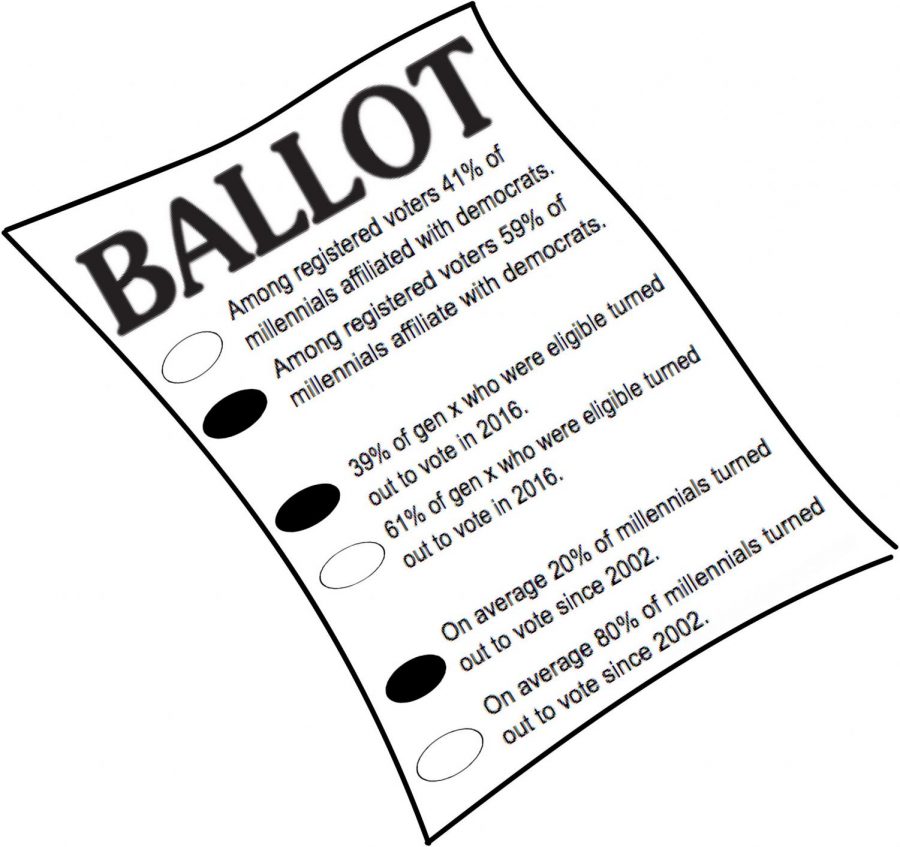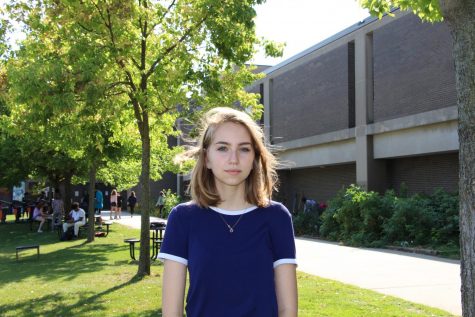Voting: an important way to have a voice in the political process
This graphic shows the true statistics behind the proportion of millennials (ages 19-31) and Gen Xers (ages 31-50) that are eligible to vote and that actually voted in the 2016 election. Voting is extremely important, especially for younger generations, because many of the issues our votes depend on have significant effects on our futures.
November 6, 2018
With midterm election season in the process, the media is swarming with political messages and people advocating for U.S. citizens to vote. But many people still wonder how important their vote really is. “Voting is important because it’s kinda the one choice we have in how we govern ourselves, kind of,’ said sophomore Ruben Lagunes. Voting is essential for a fair government that is representative of the wants and needs of our diverse society.
Voting is a way to actually have a say in the government’s decisions and actions, and using your voice to influence the state of your community is very important. “You get to choose how you want your city or country or something to be, that’s very important. If you don’t [vote], you may not like what happens,” said senior Claire Bentfield.
“There are different candidates with different ideologies and ideas on how the country should run and what paths we should take,” Lagunes said. It is important that you advocate for what ideological ideas align with yourself morally, so that our country may become more representative of how it’s citizens feel and what we want and need.
I believe that now more than ever, it is essential for people to go out and vote. We are living in a time where schools are improperly funded, the healthcare of women is up for debate, our representatives are working to delegitimize LGBT people, our climate is verging on a crisis, and more. As citizens with an ability to influence who is in charge, people should be voting for representatives who will defend such important issues, and work towards real fixes.
As young people, we need to care about these issues because so many of them affect the basic human rights of our peers and will cause consequences for our futures. Our generation’s right to life, liberty, and happiness is on the line because of critical crises like climate change and the issue of gun violence.
Another topic which hits much closer to home for the South High community is the funding of public schools. In the midterm ballot, MPLS voters will be able to make decisions regarding this issue. People will have the option to vote on two different questions from Vote Yes for MPLS Kids. These questions regard if MPLS schools should receive 30 million a year from general operation and other budgeting concerns. “Everybody goes to school and everybody benefits from public education…We should care about it and pay our teachers better,” stated sophomore Izzy Spiess.
“You can influence so many different people by how you express your political views. Even by just going to vote and showing people you care can make them care. If enough people go out and vote and just make a decision, it can really influence…people who have even more influence,” expressed Bentfield. “If you can influence the even bigger influencers, [change] is going to happen.”
In a country where voting is a right that many groups have had to fight hard to gain, I feel that it should also be perceived as an obligation. “There are kids in this country who’d like to vote, there are people in this country who deserve to be able to vote but can’t [because] felonies and stuff like that,” said Spiess. “You have a voice in this system that a lot of people are voiceless in, so you should use your voice to impact change.”
Many people question how deeply their vote really matters in an election, especially after the 2016 presidential election. However, I do not think that this is a legitimate excuse not to vote. In 2016, one significant reason that the election turned out the way it did was because many Democrats abstained from voting completely because they did not support Hillary, or voted for lesser-known third party candidates.
In a sense, the upcoming midterm election is being viewed as a way to begin to break down the strong Republican control countrywide. This election has the ability to shift the highly Republican control in the house and senate to Democratic. However, democrats would have to take over 23 currently republican seats in order to gain control. In addition, many states are having elections that could turn them from red to blue, depending on turnout of gubernatorial races.
Many people may feel that voting is not easily accessible for them. ”They might not know when it is or where it is, how to do it, they might say they don’t care, but really they do in the end,” said Bentfield.
But in this day and age, there is such an abundance of information available that can help people decide who they want to vote for. There are also many different ways for one to cast their ballot. Early voting and absentee ballots are both great options for individuals who cannot actually make it out to vote November 6th.
As for those of us who are not yet able to vote, “[People under 18] can still be up to date on all of the voting proceedings, and what’s happening politically where they live,” Bentfield said. Young people can also be politically involved by participating in “Get Out the Vote” events: doorknocking, calling, or texting possible voters. Bentfield expressed that youth don’t necessarily have to go to every political event, but that simply being educated and spreading the word can be equally powerful.
Lagunes said that “it’s good to be educated because when students speak up about something, if they know what they’re talking about, they can have a big impact on how adults see things.”
“Talk to the adults in your life. If your mom is not into voting and she ain’t going out there, you should talk to her about why you think it’s so important and why her voice really matters,” said Spiess.
Similarly, Lagunes provided another example of how young people can be influential for adults, and therefore make a positive impact without voting. “Let’s say my grandfather didn’t grow up in a very diverse situation, whereas I’m going to school with people of all different ethnicities and backgrounds, so that will change our views,” he said. “If I can explain my view on something to my grandfather, he might get a little bit of insight that he wouldn’t have been able to get before.”
Moreover, keeping yourself educated is important so that when you do reach 18, you’ll go into voting with an already deep understanding of politics, and a well-rounded, strong personal opinion. As Bentfield said, “Some people just go out and vote because they can, but you really need to know what’s going on.”








